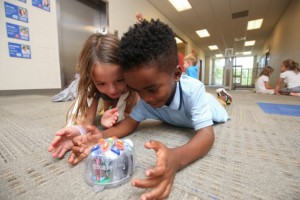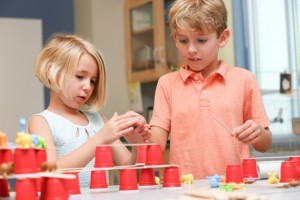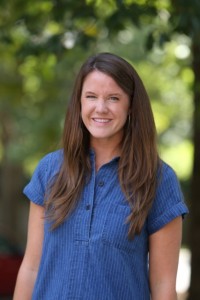
By Samantha Hale, 5th grade teacher, Charlotte Christian School
Each year my head spins with ideas about how to empower my students and help them to become successful writers. I know this similar ideal is true for my colleagues here at Charlotte Christian. I’m not a parent yet, but I imagine a parent brims with ideas of their child’s possibilities. We all are working together for the common goal of helping students reach their potential, helping them achieve success. The lower school has been discussing and learning about a mindset that leads to that end.
Recently, in our lower school professional development, Fourth Grade Teacher Lisa Smitherman gave a wonderful presentation on the growth mindset. In summary, there are two types of mindsets: growth and fixed. Carol Dweck, author of Mindset: The New Psychology of Success, defines a growth mindset as, “People believing that their most basic abilities can be developed through dedication and hard work – brains and talent are just the starting point. This view creates a love of learning and a resilience that is essential for great accomplishment.” On the other hand a fixed mindset is characterized by believing your intelligence or abilities are static, unchangeable. Parents and teachers should encourage students to possess the growth mindset in all areas of their life. Modeling the growth mindset will also set an example for children to follow. We should all ask ourselves “What mindset do I usually possess? What do I model for my student?”
As I walked into my classroom the day after professional development, I reflected on each of my students and the mindset that they walk into my classroom with, as well as the mindset I model for them. Some of my learners persevere even when learning or trying something new is difficult, while others tend to believe they cannot succeed before they even see if they can. The way I react as their teacher, and the way their parents react, can help them continue in the growth mindset or shift away from the fixed. Our praise should encourage effort and my lessons should foster a love for the process rather than a desired positive outcome. In thinking about what the Bible might say about the growth mindset, I am reminded of Colossians 3:23 that reminds us all, “Whatever you do, work heartily, as for the Lord and not for men.” Doing our best is Christ-honoring and is not based on achieving specific results.
Somewhere along the way, we, as teachers and parents, have at times confused wanting our children to be successful and instead have become focused on helping them to feel successful. We lavish them with praises and rewards when they do a good job for we want them to feel success in small ways in hopes that they will succeed in big ways. We do this because we love them, we see their potential, and we desire the best for them. The question we must all return to is, “Are we creating lifelong learners?”
Students with a growth mindset will understand that the way they become more intelligent or master a new skill is by developing it through hard work, practice, and time. Therefore, as educators we want to give process praise rather than person praise (MindsetKit). For example, when a student(s) comes home with excellent work rather than hearing, “You are so smart! I knew you could do it!” they should hear, “You must have worked really hard on this! I’m proud of your effort.” Encouraging the process and development rather than the outcome and their ability will lay a foundation in the way that they think and the way they learn. Possessing a growth mindset will positively impact all areas of their life, as they understand that we are never done learning.
In our efforts to help our students find success, we must help them to see that hard work is a crucial component of learning. Whether they are practicing their soccer skills, solving math problems, or reading their Bible, this growth mindset can be applied. And our praise and the way we respond to their efforts can serve to develop this mindset within them. For we know as humans, as Christ-followers, we should continually grow and learn, putting time and effort in, especially in the face of obstacles, so that we all may find success.
![]()
 Samantha Hale has taught fifth grade at Charlotte Christian since 2013. She attended Louisiana State University where she earned her master’s degree in teaching and her bachelor’s degree in elementary education. She is married to Kevin and enjoys traveling, running, and decorating her home. She enjoys working at Charlotte Christian because of the opportunity to nurture and challenge my students both academically and spiritually.
Samantha Hale has taught fifth grade at Charlotte Christian since 2013. She attended Louisiana State University where she earned her master’s degree in teaching and her bachelor’s degree in elementary education. She is married to Kevin and enjoys traveling, running, and decorating her home. She enjoys working at Charlotte Christian because of the opportunity to nurture and challenge my students both academically and spiritually.
![]()
Charlotte Christian School
7301 Sardis Road
Charlotte, NC 28270
(704) 366-5657
website
Facebook
Twitter: @charchristiannc
Instagram: @charlottechristianschool




1 comment
What a well-written article on such a pertinent topic of concern in education! Samantha, I commend you for being such a concerned and intuitive educator. Your students are lucky to have you.